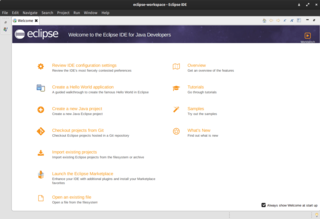
Eclipse is an integrated development environment (IDE) used in computer programming. It contains a base workspace and an extensible plug-in system for customizing the environment. It is the second-most-popular IDE for Java development, and, until 2016, was the most popular. Eclipse is written mostly in Java and its primary use is for developing Java applications, but it may also be used to develop applications in other programming languages via plug-ins, including Ada, ABAP, C, C++, C#, Clojure, COBOL, D, Erlang, Fortran, Groovy, Haskell, JavaScript, Julia, Lasso, Lua, NATURAL, Perl, PHP, Prolog, Python, R, Ruby, Rust, Scala, and Scheme. It can also be used to develop documents with LaTeX and packages for the software Mathematica. Development environments include the Eclipse Java development tools (JDT) for Java and Scala, Eclipse CDT for C/C++, and Eclipse PDT for PHP, among others.
Telegard is an early bulletin board system (BBS) software program written for IBM PC-compatible computers running MS-DOS and OS/2. Telegard was written in Pascal with routines written in C++ and assembly language, based on a copy of the WWIV source code.
Synchronet is a multiplatform BBS software package, with current ports for Microsoft Windows, Linux, and BSD variants. Past versions also ran on MS-DOS and OS/2, but support for those platforms were dropped in version 3.0.
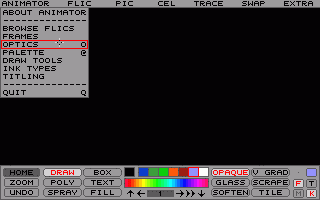
Autodesk Animator is a 2D computer animation and painting program published in 1989 for MS-DOS. It was considered groundbreaking when initially released.
WWIV was a popular brand of bulletin board system software from the late 1980s through the mid-1990s. The modifiable source code allowed a sysop to customize the main BBS program for their particular needs and aesthetics. WWIV also allowed tens of thousands of BBSes to link together, forming a worldwide proprietary computer network, the WWIVnet, similar to FidoNet.
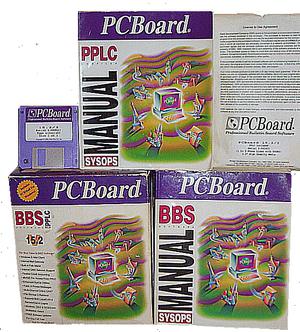
PCBoard (PCB) was a bulletin board system (BBS) application first introduced for DOS in 1983 by Clark Development Company. Clark Development was founded by Fred Clark. PCBoard was one of the first commercial BBS packages for DOS systems, and was considered one of the "high end" packages during the rapid expansion of BBS systems in the early 1990s. Like many BBS companies, the rise of the Internet starting around 1994 led to serious downturns in fortunes, and Clark Development went bankrupt in 1997. Most PCB sales were of two-line licenses; additional line licenses were also available.

Watcom C/C++ is an integrated development environment (IDE) product from Watcom International Corporation for the C, C++, and Fortran programming languages. Watcom C/C++ was a commercial product until it was discontinued, then released under the Sybase Open Watcom Public License as Open Watcom C/C++. It features tools for developing and debugging code for DOS, OS/2, and Windows, Linux operating systems, which are based upon x86 or x86-64 compatible processors.

File Manager is a file manager program bundled with releases of OS/2 and Microsoft Windows between 1988 and 1999 and available from 6 April 2018 as an optional download for all modern releases of Windows, including Windows 10.
McBBS was a Bulletin Board System developed by Derek E. McDonald and distributed by DMCS Technologies between October 30, 1989, and May 30, 2000, and operated over 18 versions.

GitHub is a developer platform that allows developers to create, store, manage and share their code. It uses Git software, providing the distributed version control of Git plus access control, bug tracking, software feature requests, task management, continuous integration, and wikis for every project. Headquartered in California, it has been a subsidiary of Microsoft since 2018.

Etherpad is an open-source, web-based collaborative real-time editor, allowing authors to simultaneously edit a text document, and see all of the participants' edits in real-time, with the ability to display each author's text in their own color. There is also a chat box in the sidebar to allow meta communication.

OpenTG is an open-source implementation of a bulletin board system (BBS) software program written for Linux and/or Unix. Written from scratch in JRuby, the goal is to reproduce the look, feel, and functionality of similar legacy BBS systems such as Tag, Telegard, Maximus or Renegade, which were written for DOS and OS/2 during the pre-internet communication era. No original code from any BBS has been used nor referenced in order to focus on innovation and unique capabilities.
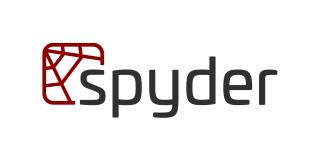
Spyder is an open-source cross-platform integrated development environment (IDE) for scientific programming in the Python language. Spyder integrates with a number of prominent packages in the scientific Python stack, including NumPy, SciPy, Matplotlib, pandas, IPython, SymPy and Cython, as well as other open-source software. It is released under the MIT license.
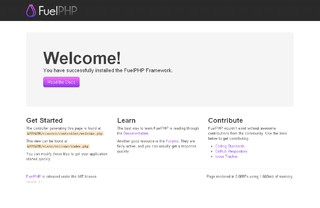
FuelPHP is an open-source web application framework written in PHP which implements the HMVC pattern.

ERPNext is a free and open-source integrated Enterprise resource planning (ERP) software developed by an Indian software company Frappe Technologies Pvt. Ltd. It is built on the MariaDB database system using Frappe, a Python based server-side framework.
This is a timeline of GitHub, a web-based Git or version control repository and Internet hosting service.

The Pop PHP Framework a free and open source PHP Web framework that was created by Nick Sagona. It is distributed under the BSD License and hosted on GitHub. The framework is intended to be utilized for rapid application development, with an emphasis on web applications.












